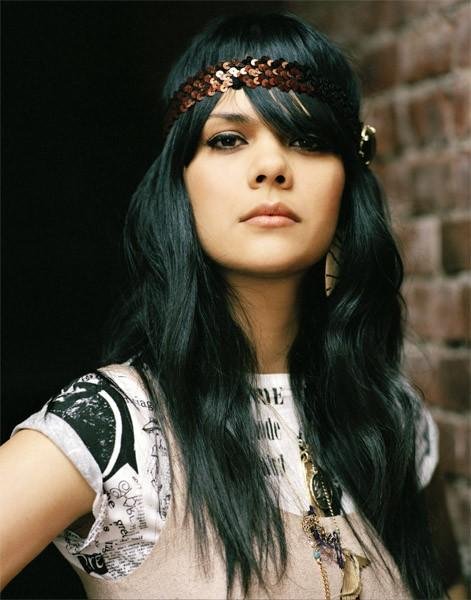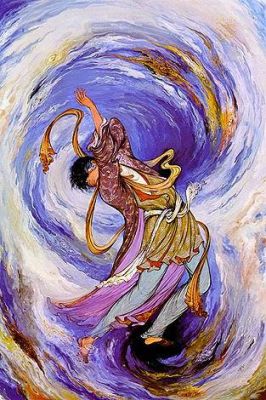Lately, I’ve been experimenting with a computer electronic music program I have called FL Studio. Playing piano has been a hobby of mine since my father bought me an electronic keyboard when I was in 6th grade. A good friend of mine also owned a keyboard and he would always try to play melodies from movie soundtracks, so him and I would compete with one another on who could play a certain song first. Sometimes, we’d call each other over the phone and show off with what we figured out. The first tune I played was the “Mission: Impossible” theme, lol. This went on for a while and before I knew it, I could play “Jurassic Park,” “Star Wars,” “James Bond,” “Back to the Future,” and even classics like “Fur Elise.” I don’t remember exactly when I created my own song, but I know it was some time in high school. I guess I got bored of playing other people’s music, and also, I thought about creating music for my short films.
I never took any piano lessons, which still seems to surprise people when they see me play. I took a “Rudiments of Music” class in my Sophomore year of college and our final project was to write a composition. When I played my piece for my teacher (a song I called “Writing in the Dark”), he was impressed and said that I played like a professional. It was also cool to see him read my musical notes and play my song! It reminded me of the feeling I get when I see actors give life to the dialogue that I write in my screenplays. The more I practiced and played piano in front of guests and family members, the better feedback I received. My friends would tell me “compose your own music for your films,” and I just took it as a compliment and never thought about it seriously. I got my new keyboard when I graduated from high school in 2002, so yeah it’s pretty old, but still decent. Even though I wanted to form a musical band with my friends, it just remained talk and ideas, it was never as serious as our filmmaking.
So recently, I felt a desire to professionally record my music and when I learned that I could do this in my own house, I got excited and did research on what I needed to make this possible. It turned out that all I needed was a MIDI cable, which would enable me to hook my keyboard into my USB drive. FL Studio is an amazing program and I’m just amazed at how much people can do with it. I don’t mean to sound like a cheap advertising commercial, but the possibilities seem to be endless! I have a couple of plug-ins for orchestral and ethnic instruments — acoustic sounds that I would never get from my keyboard. I’m sure we all see the pros and cons of the technology age, but when it comes to creating music and filmmaking, computer programs such as FL Studio provide so many opportunities. Even with YouTube (where I plan to upload some of my short films, insha’Allah), one can share his/her work with so many people in the world.
I think it’s a beautiful thing for people to express themselves through artistic expression such as music. I know there are some Muslims who condemn music as being haram (forbidden), but I really mean no disrespect to their opinions and views on this matter. Prohibition of music is never even mentioned in the Qur’an; on the contrary, the Book of Zabur (Pslams) is mentioned and Muslims are taught that Prophet Dawood (David), peace be upon him, had a beautiful singing voice. I spoke with a contemporary Muslim poet in Philadelphia one year and we discussed the issue of music in Islam, and he told me that it’s a shame so many Muslims condemn it because music is very spiritual. The Qur’an itself, and the way it is recited, is actually very melodious, as is our daily prayers. Even in Islamic history, in the centuries following the death of the Prophet Muhammad, peace be upon him, many Muslims theorized about music and even influenced Medieval European music. Give Medieval European music a listen some time, and you will notice how you can find similarities in Arabic music. This is because 11th century Italy used earlier Arabic musical notations from the 9th and 10th century. In his book, Historical Facts of the Arabian Musical Influence, H.G. farmer presents the following comparison of Italian and Arabic notations:
Arabic Alphabet: Mi Fa Sad La Sin Dal Ra
Italian Notes: Mi Fa Sol La Si Do Re
It is also interesting to note that the Spanish form of music known as “flamenco” was created by Spanish Muslims who faced expulsion, forced conversion, and even death from the Catholic reconquest of Granada. Many of these Spanish Muslims (or ‘Moors’ as the Europeans called them) joined gypsies on their way out of the country. “Flamenco” derives from the Arabic term “fellah mengu” which means “country vagabonds.” What’s even more fascinating is when one looks at the evolution of musical instruments. From the 8th and 9th centuries, music instruments from the Muslim world spread into Northern Christian Spain, France, and Italy via Muslim entertainers and minstrels. According to historians and authors Dr. Rabah Saoud and Michael H. Morgan: “The Muslim ‘oud will spawn the European lute and later the guitar and mandolin. The Arabic ghaita will evolve into the Scottish bagpipe and Spanish and Portuguese gaita. The Muslim qanum will give birth to the English harp and the German zither. The Persian kamancha and Arab rabab will morph into the fiddle. The Muslim zurna, a woodwind instrument, will lead to the oboe. The Persian santur, an early form of the hammered dulcimer, will give rise to European keyboard instruments.”
Pretty cool, huh? As we consider history and then observe the type of music being produced in the world today (including in the Muslim world) we see less art in the entertainment industry. I’m sure there were Muslim clerics who prohibited music in the past, but I believe it was tolerated overall. I believe we see Muslim clerics condemning music today because of the type of material there is. Mainstream Arabic music, for example, emulates Western pop music. It tries to be unique with its tabla drum rhythms and Arabic scales, but the songs are so formulaic that Arabic originality is lost completely. Even in mainstream Pakistan and Indian music, we see the emulation of mainstream western music, despite the usage of sitars, flutes, and tablas. The emphasis on sexuality especially is very strong and its no wonder why clerics call music “haram.” I understand how music with pornographic and violent lyrics are considered haram, but what about the true artists and musicians out there who are making music to inspire spirituality, social change, unity, and peace? We don’t see the true artists put into the spotlight anymore because maybe these artists aren’t as “attractive” or “pretty” as record companies would like them to be, or maybe their lyrics aren’t as controversial and provocative as they “should” be. I find that there are very few mainstream musicians out there who are creating music for the passion of it. It’s so money driven that I cannot even bring myself to ever listen to the radio. My choice of music is very selective, and many of the musicians I listen to are Muslim, Middle-Eastern, and South Asians who aren’t even well known in their own communities! Musicians like the Iranian female singer/composer Azam Ali, the Indian-American composer Karsh Kale, the Turkish mystical musician Omar Faruk Tekbilek, Iranian New Age artist Jamshied Sharifi, Moroccan spiritual singer Hassan Hakmoun, the late Nubian traditionalist Hamza Al-Din; or the countless ethno-electronica bands and artists like Samsara Sound System, Afro-Celt Sound System, Dhol Foundation, Al-Pha X, Cheb i Sabbah, Mercan Dede, etc. Let’s not forget the legends like Pakistan’s Nusrat Fateh Ali Khan and Egypt’s Umm Kalthoum. Non-Muslim musicians like Lisa Gerrard (you may have heard her hauntingly beautiful vocals if you’ve seen the film “Gladiator”) and Elizabeth Fraiser also fit in this category of true artists. There are also many Sufi-inspired bands like Stellamara and Lumin.
Azam Ali’s “Niyaz” album celebrates ancient Sufi poems, and the band describes their album as “folk music for the 21st century.” Azam Ali sings Urdu and Farsi poems that have been penned by divinely inspired poets hundreds of years ago. Should we deny the talent and say that these kind of songs that praise God, the Prophets, and spirituality, are haram? I think the big misunderstanding that people make is that they think music is meant to replace prayer. Music has a place in this world and its not meant to argue that prayer is not a worthy practice. I believe that people are born with beautiful Gifts and if they do not share that Gift, then the world will be missing out on it. We would be denying our purpose in this world. I’m not trying to win a Grammy or anything, but I still consider music to be a special hobby of mine. It has also been a little therapeutic for me. It helps me express myself with all that I’m going through these days. Anyway, I thought about sharing some of my latest recordings on my blog.
The first song is called “Incomplete”. It’s only about a minute and a half, it was just a trial run because I was just testing out the program. This is just a short version too, I have the longer version but I haven’t recorded it yet. Insha’Allah I will soon. Right click on the title below and click “save target as” if you want to save it. You can play it with Winamp or Windows Media Player.
Incomplete – Viola Section.
The second song is called “Ya Nabi.” It can be difficult to record this song because of the two layers of piano and strings. I like the new orchestral sound it has to it, but I still think it sounds much better when I play it live. Anyway, my friends say that this is my best song. I made it for Prophet Muhammad, peace be upon him. I can’t remember exactly when I came up with it, but I remember that it was after 9/11 when I was upset about Islamophobia and how our beloved Prophet was being vilified in the media (and still is). It has a very cinematic sound to it and sounds a little sad in the beginning, but it symbolizes my sadness at how someone so beautiful can be vilified.
Ya Nabi — Slow Strongs.
In advance, thank you so much for reading and taking the time to listen. The recordings are not the way I would like them to be, but I think they’re nice for a quick trial run. I find music is to be very spiritual and I think we need to encourage the Muslim youth to explore their creative sides more, rather than discourage them.
Today, like every other day, we wake up empty
and frightened. Don’t open the door to the study
and begin reading. Take down a musical instrument.
Let the beauty we Love be what we do.
There are hundreds of ways to kneel and kiss the ground.
~ Jalaluddin Rumi,
13th Century Islamic mystic and poet



